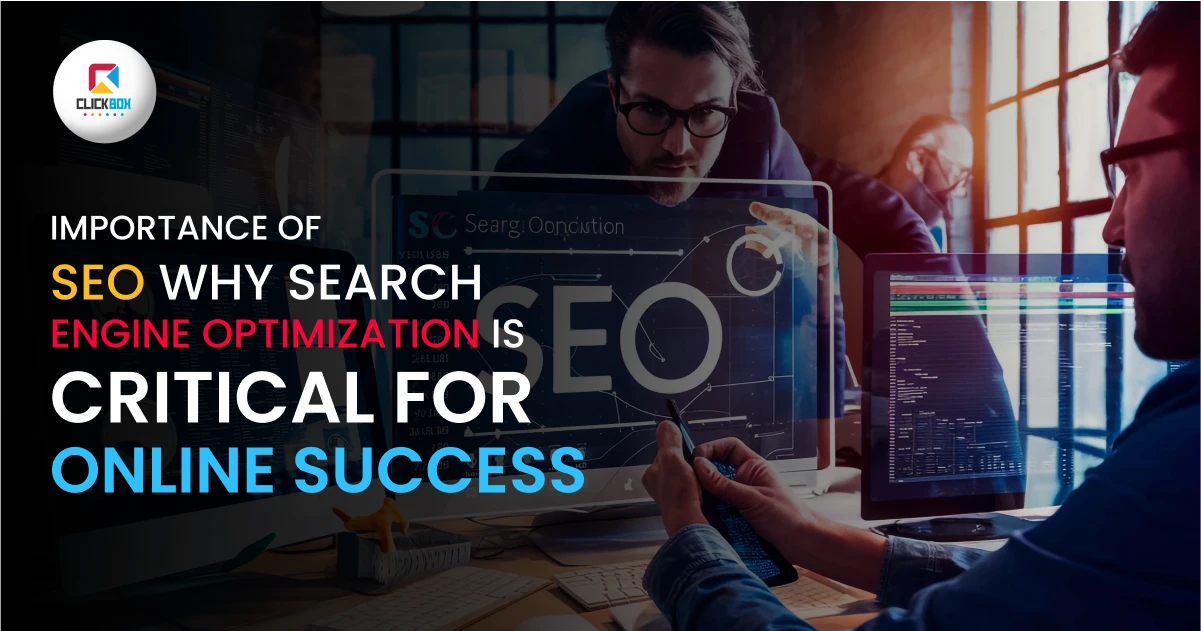Importance of SEO: Why Search Engine Optimization is Critical for Online Success
A strong online presence is now a must for every organization looking to thrive in the digital age. It is no longer a choice. Since the internet has become the go-to resource for information, entertainment, and business, businesses need to make sure that those who want to do business with them can simply find their websites which ClickBox makes it easier. This is the point at which the importance of SEO becomes essential.
What is SEO?
Before diving into why SEO is important, it’s necessary to understand what it is. SEO refers to the practice of optimizing a website using SEO best practices to improve its ranking on search engine result pages (SERPs). When someone types a query into a search engine like Google, the search engine’s algorithm analyzes the vast expanse of content on the web and delivers the most relevant results. SEO ensures that your website appears in these results, ideally at the top of the page.
SEO for websites is an umbrella term that covers a wide array of techniques, including keyword research, content creation, on-page optimization, link building, and technical SEO elements like site speed and mobile-friendliness. The ultimate goal is to attract organic (unpaid) traffic, which, when combined with other digital marketing strategies, can lead to higher engagement, conversion rates, and business growth
15 Important Reasons Why SEO Is Important
1. Increased Visibility and Brand Awareness
The primary reason why SEO is important is the increase in visibility that it provides. Studies show that the vast majority of users never venture beyond the first page of Google search results. Understanding how SEO works helps you become one of the top listings, which not only ensures that more people see your brand but also establishes credibility. People typically believe websites on the first page are more trustworthy and authoritative because they trust Google's ranks.
When your site consistently ranks high for relevant keywords, the importance of SEO becomes evident as your brand becomes more recognizable, which is key in building trust with potential customers. Over time, users will become more familiar with your brand, making them more likely to engage with your site when they need the products or services you offer.
2. Organic Traffic Is Highly Valuable
Unlike paid advertising, which requires constant funding, organic traffic through SEO is essentially 'free.' Of course, SEO best practices require time and resources, but once you’ve established a strong online presence, the traffic will continue to flow to your website without the need for ongoing ad spend. Organic search results also tend to drive more qualified traffic, meaning visitors who are more likely to convert into customers because they are actively searching for information or products related to your business
SEO for websites targets users who are already searching for something specific. Whether they’re looking for a product, service, or just information, if your website offers what they need, SEO helps connect them with your content.
3. SEO Builds Credibility and Trust
One of the most significant benefits of ranking highly in search engines is the trust it garners from users. Google is the most widely used search engine globally, and its algorithms are designed to provide users with the most relevant, accurate, and trustworthy results, illustrating how SEO works effectively. When your website appears on the first page of Google, it signals to users that your site is a credible source of information
Building excellent backlinks from other reliable websites is another aspect of the importance of SEO. Backlinks act as a vote of confidence from one site to another, further boosting your site’s credibility in the eyes of both search engines and users.
4. Improved User Experience
In SEO, user experience (UX) is very important as part of SEO best practices. Search engines favor websites that offer an excellent user experience, meaning your website’s layout, design, speed, and functionality all impact your SEO rankings. Factors such as easy navigation, mobile-friendliness, and fast loading times are essential components of both good UX and SEO
By focusing on SEO, you’re also forced to improve your website’s overall functionality. This not only benefits search engine rankings but also ensures that visitors to your site have a positive experience, which can lead to higher engagement and conversion rates.
5. SEO Is a Long-Term Strategy
One of the most appealing aspects of SEO is its long-term impact. The benefits of a strong SEO strategy can persist for years, in contrast to paid advertising efforts, which cease to provide visitors as soon as you stop paying.While it does take time to see significant results, once your website has a strong SEO foundation, you’ll continue to reap the benefits for months, if not years, with minimal maintenance.
The ongoing importance of SEO means that your business can grow steadily without the need for a constant financial investment in advertising. With consistent effort, your rankings can improve, bringing in more traffic and driving sustained growth.
6. Higher ROI Compared to Paid Advertising
Paid advertising campaigns like Google Ads can yield quick results, but they come with a cost. Every click, view, or conversion has a price. SEO, on the other hand, offers a more cost-effective strategy in the long run. While it may take longer to see the fruits of your labor, the organic traffic generated through SEO doesn’t incur a cost per click. This makes SEO one of the most cost-effective marketing strategies available.
Furthermore, SEO delivers a higher return on investment (ROI) because it targets users who are actively searching for your products or services. These users are much more likely to convert, making your efforts in SEO more efficient than broader paid campaigns.
7. Competitive Advantage
Nowadays, the great majority of companies understand how important SEO is. You're offering your rivals a big edge if you ignore SEO. In addition to keeping your company competitive in the market, a solid SEO plan keeps you from losing out on potential clients and important traffic to competitors.
Moreover, it can be challenging to stand out in a lot of businesses due to an excess of rivalry. Understanding the importance of SEO, your company can outrank rivals and increase brand awareness, , and revenue.
8. SEO Supports Other Marketing Efforts
SEO doesn’t just benefit your organic search results—it also complements other marketing strategies like content marketing, social media, and email campaigns. By following SEO best practices, such as creating optimized blog posts, you’re providing content that can be shared on social media platforms and linked to in email newsletters, further increasing your reach.
Additionally, SEO for websites can offer valuable insights into customer behavior. By analyzing which keywords drive traffic to your site, you can better understand what your target audience is looking for and use that information to refine other areas of your marketing strategy.
9. Local SEO Attracts Nearby Customers
Local SEO is a subcategory of SEO that focuses on optimizing your website to rank well in local search results. This is especially important for businesses with a physical presence, as local SEO can help drive foot traffic to your storefront. For instance, when users search for "Technical seo agency in coimbatore" or "Best graphic design company in coimbatore" local SEO ensures that your business appears in the results.
With mobile search on the rise, the importance of SEO has become even more critical for local businesses. Optimizing for local search involves claiming and optimizing your Google My Business profile, collecting positive customer reviews, and ensuring your website is optimized for local keywords.
10. SEO Keeps You Ahead of Trends
The digital landscape is ever-changing, and businesses must stay ahead of the curve to remain competitive. By continually refining your SEO strategy and implementing SEO best practices, you’ll stay up-to-date with the latest industry trends and changes in search engine algorithms, including how SEO works. SEO professionals are constantly adapting to new updates from search engines like Google, which means businesses that prioritize SEO are better equipped to respond to changes in the online ecosystem.
In addition, the future of online marketing is being shaped by SEO developments like mobile-first indexing and voice search optimization. By staying on top of these trends, you can ensure your business is well-positioned to capture new opportunities in the digital space.
11. Better Conversion Rates
Effective SEO doesn't just bring more traffic to your site—it brings the right traffic. SEO targets users who are actively searching for what you offer, making them more likely to convert into paying customers. By delivering content that matches user intent, you create a more seamless and satisfying experience for visitors, increasing the chances that they will complete a desired action, submitting an online form, purchasing something, or subscribing to a newsletter
12. It’s a Measurable Strategy
One of the significant advantages highlighting the importance of SEO is that it’s highly measurable. Using tools like Google Analytics, you can track key metrics such as website traffic, keyword rankings, conversions, bounce rates, and more. This level of insight allows you to see what’s working and what’s not, enabling you to adjust your strategy as needed. The data-driven nature of SEO means you can continually optimize your site for better performance and results.
13. SEO Provides Insights into Customer Behavior
Analytics and SEO technologies provide priceless information about how your target audience behaves.
By analyzing search trends, keywords, and on-site interactions, you can learn more about what your customers are looking for, how they interact with your content, and what drives them to convert. These insights can inform not just your SEO strategy but also your overall marketing, sales, and product development efforts.
14. SEO Can Enhance Website Usability
As mentioned earlier, SEO requires improving the user experience of your website, which indirectly boosts usability. Understanding how SEO works means ensuring a site that loads quickly, is mobile-friendly, and offers a seamless navigation experience, which is not only favored by search engines but also appreciated by users. In essence, SEO helps create a better, more accessible website that satisfies the needs of both search engines and users
15. SEO Is an Investment in Your Future
long-term success. While the upfront costs may seem significant, the benefits far outweigh the initial expenditure. As your website gains more traffic, builds credibility, and drives more conversions, you’ll see a substantial return on your SEO investment.
In conclusion, SEO is an indispensable tool for any business looking to thrive in the digital space. It enhances visibility, drives organic traffic, builds trust, and delivers a high return on investment. By improving your website's usability and aligning it with user intent, SEO not only attracts the right audience but also boosts conversions. As a long-term strategy, it offers sustained growth and keeps you ahead of competitors and digital trends. Investing in SEO today ensures that your business is well-positioned for success in the future, helping you meet evolving customer needs and market demands. .
This ongoing effort encourages adaptation and enhancement, resulting in a better user experience and more effective marketing efforts overall.
John Click
Digital Marketer | SEO Copywriter | Content Strategist
Experienced digital marketer with a proven track record in creating compelling content that not only engages audiences but also drives conversions and enhances SEO visibility. My expertise extends beyond marketing strategy to crafting persuasive narratives that resonate with your target audience. I combine data-driven strategies with captivating writing to deliver measurable results, ensuring your brand shines in the digital landscape.
John Click
Digital Marketer | SEO Copywriter | Content Strategist
Experienced digital marketer with a proven track record in creating compelling content that not only engages audiences but also drives conversions and enhances SEO visibility. My expertise extends beyond marketing strategy to crafting persuasive narratives that resonate with your target audience. I combine data-driven strategies with captivating writing to deliver measurable results, ensuring your brand shines in the digital landscape.




 Digital Marketing
Digital Marketing


 Digital Marketing
Digital Marketing Digital Marketing
Digital Marketing



